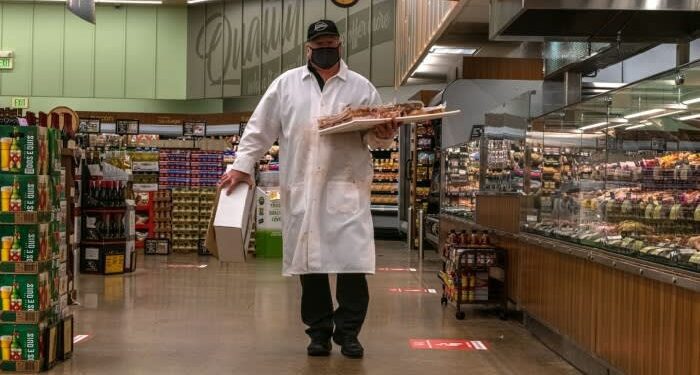Authorities challenging the largest supermarket deal in US history have said it must be blocked to protect unionised workers.
Not every labour leader agrees.
Kroger’s $24.6bn purchase of Albertsons “is not necessarily evil,” said John Niccollai, president of the United Food and Commercial Workers union local 464A, which represents Albertsons’ workers in parts of New York and New Jersey.
“Wouldn’t it be in the best interest of working men and women to have a totally unionised large national employer? And that’s really what a merger of Albertsons and Kroger would bring to fruition.”
Legal cases challenging the deal are moving through the court system. Final briefs were filed on Friday after a trial in which the Federal Trade Commission, eight states and the District of Columbia asked a federal judge for an injunction.
A separate case brought by the state of Washington is at trial. A third trial will begin in Denver on Monday after Colorado sued to block the takeover.
All three lawsuits go beyond customary claims about protecting consumers to allege harms to workers from the deal. But the FTC’s labour argument is the most extensive.
The FTC says uniting Kroger and Albertsons would diminish the bargaining power of unions that represent hundreds of thousands of employees at the two companies’ stores, because the two companies compete for workers.
“The proposed acquisition would eliminate that competition, likely leading to lower wages and reduced benefits, opportunities, and quality of workplace conditions and protections for thousands of [the companies’] employees,” said the FTC’s lawsuit.
Colorado attorney-general Phil Weiser said in his case: “Kroger and [Albertsons] are direct, horizontal competitors for labour.”
John Niccollai is president of the local union that represents Albertsons’ workers in parts of New York and New Jersey © Gregory Meyer/FT
Kroger and Albertsons together have more than 700,000 employees across almost 5,000 stores. They are the first and second biggest supermarket chains in the US.
The companies say they need to merge to survive intensifying competition from Walmart, Costco, Amazon and other rivals.
Walmart and its Sam’s Club warehouse chain now account for 25.7 per cent of US grocery sales, according to Numerator, a market research firm, while Kroger and Albertsons together have 14.4 per cent.
To address concerns the combination would eliminate competition in some places, the companies have pledged to sell 579 stores to a group called C&S Wholesale Grocers. Worker groups have questioned the ability of C&S to manage the stores, invoking bitter memories of stores Albertsons sold off when it bought supermarket chain Safeway in 2015 to a company that soon went bankrupt.
Leaders of UFCW International, the overarching body for local union affiliates around the US and Canada, voted unanimously to oppose the Kroger-Albertsons deal.
“We know what this type of consolidation means,” said Kim Cordova, president of UFCW Local 7, which represents Kroger and Albertsons workers in Colorado and Wyoming. “It’s great for Wall Street, it’s great for executives, but it’s really bad for workers, retirees, farmers, ranchers.”
Cordova and Niccollai are also vice-presidents at UFCW International.
Niccollai, who has served as Local 464A president since 1982, said he also endorsed UFCW International’s opposition to the merger.
“We’re team players. You can’t have a union divided. So we’ve taken the position that we’re opposed to the merger,” he said.
Yet in the north-east, where Albertsons but not Kroger has supermarkets, Niccollai warned blocking the deal could have unintended consequences for his members who work at Albertsons-owned Acme and Kings stores.
“I am concerned that if this merger doesn’t go through, it could put those stores in jeopardy,” Niccollai said.
Vivek Sankaran, chief executive of Albertsons, testified in the FTC trial that if the deal does not close, management would have to consider options including job cuts, store closures, exiting certain markets or a sale of the company.
“It would mean thinking about assets that are not performing and making tough decisions on them; about businesses that are not performing and making tough decisions on them,” Sankaran said in court.
One UFCW local union, number 555 in Oregon, originally backed the merger but withdrew its support last month after reviewing what it said was new information that surfaced during ongoing contract talks with Kroger. Local 555 members undertook a six-day strike at Kroger’s Fred Meyer stores in August and September.
No other UFCW has endorsed the merger. But some other local union leaders have privately expressed worries that “Kroger is the only viable union operator to buy Albertsons, and if this doesn’t go through, Albertsons is going to get bargained off in pieces and sold to non-union retail competition,” said Henry Mellet, a senior director at Strategic Resource Group, a consultancy that has union locals and retailers as clients.
Niccollai said: “There’s really a dichotomy of opinions, because we have local unions that have different issues.”
Under its chair Lina Khan, the FTC has taken up worker protections as part of its focus. Last month, the agency signed a memorandum of understanding with the National Labor Relations Board, the Department of Labor and the Department of Justice antitrust division to collaborate on labour matters in antitrust investigations of mergers.
However, the FTC on Friday said it will withdraw from the agreement, without explaining why.
Source link : http://www.bing.com/news/apiclick.aspx?ref=FexRss&aid=&tid=66f9287e51ed4031844c959cfe6e27e5&url=https%3A%2F%2Fwww.ft.com%2Fcontent%2Ffc00c516-6063-46be-a5d6-7a2f2187427b&c=14953483832023591182&mkt=en-us
Author :
Publish date : 2024-09-28 23:00:00
Copyright for syndicated content belongs to the linked Source.








